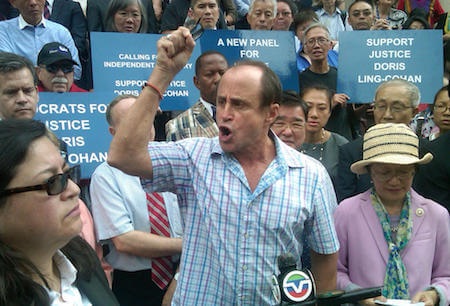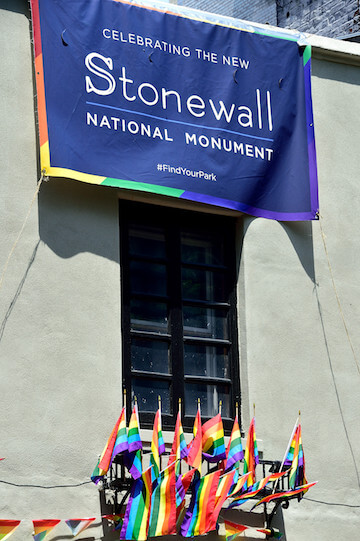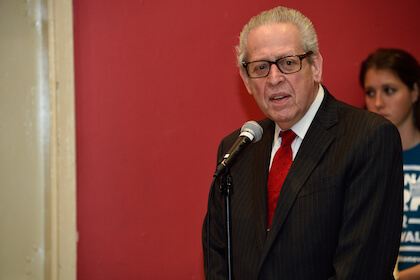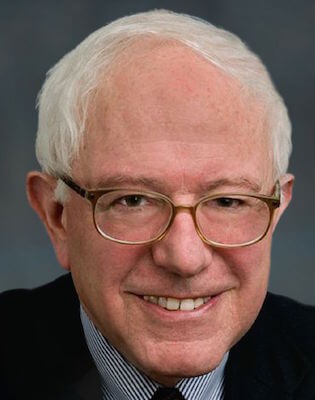A contentious battle is heating up in the State Legislature over competing bills that would legalize surrogacy rights in New York after a version proposed by out gay Manhattan State Senator Brad Hoylman and Westchester Assemblymember Amy Paulin stalled last year amid concerns about women’s rights and welfare.
Hoylman and Paulin are again pushing their bill, which has strong support from Governor Andrew Cuomo, but Manhattan State Senator Liz Krueger, out gay Manhattan Assemblymember Daniel O’Donnell, and Assemblymember Didi Barrett of Dutchess and Columbia Counties are barreling ahead with their own version that they say was crafted based on further evaluation of the previous bill and feedback from women who voiced concerns with last year’s proposal. Krueger and Barrett are listed as lead sponsors on the bills.
“The other bill laid dormant for a very long time and no outreach was done to women’s groups to find out where they would fall on this,” O’Donnell asserted in an interview with Gay City News on February 21.
There are significant differences between the two pieces of legislation. The new bill, listed as S7717 in the Senate and A9847 in the Assembly, would not just legalize gestational surrogacy, which entails a woman carrying a baby unrelated to her, but also genetic surrogacy, which is when a woman carries a baby conceived through fertilization of her own egg. Hoylman and Paulin’s version of the bill only addresses gestational surrogacy.
Hoylman, who has had two children through gestational surrogacy with his husband, David Sigal, argues his bill contains the “strongest legal protections” for surrogates — and it is true that the bill requires intended parents to cover costs such as healthcare and independent legal representation for the surrogates, many of whom become surrogates for economic reasons.
One key point of contention in the bill put forth by Krueger, O’Donnell, and Barrett is a requirement that intended parents undergo medical and psychological evaluations, a home study, and background checks.
The National Center for Lesbian Rights, GLBTQ Legal Advocates and Defenders, Lambda Legal, the LGBT Bar Association of Greater New York, and the Family Equality Council penned a letter to Krueger, O’Donnell, and Barrett ripping their bill for several reasons, including those requirements forced upon intended parents. They stated that the requirements unfairly harm LGBTQ families because “this kind of investigation and evaluation would be unthinkable for parents who planned to have children through sexual intercourse… Surrogacy is not an adoption…”
Another key difference between the bills involves the point at which the intended parents officially become the child’s legal parents. Hoylman’s bill calls for pre-arranged agreements stipulating that the intended parents gain full legal rights of the child upon birth, but the alternative bill imposes an eight-day waiting period after the baby is born during which the intended parents and the surrogate share responsibility for the child. By the conclusion of that period the surrogate can submit a notarized declaration that would officially hand over full responsibility for and authority over the child to the intended parents.
That, of course, comes with a big question: What happens if a surrogate refuses to legally hand over a child to a biological parent and their spouse who have spent months paying tens of thousands of dollars to have a child through surrogacy? In a phone interview with Gay City News, Krueger defended the provision and downplayed worst-case scenarios, saying that it is rare that a surrogate would refuse to give up a child.
“The more careful and transparent and deliberate and informed this can be set up, the less likely it is the surrogate would change their mind,” Krueger said.
“But it is true that the surrogate is carrying the embryo through pregnancy to delivery. It’s taking their blood, their nutrients — everything you’re going through as a surrogate, the baby is going through. I just think, having talked to all kinds of human rights lawyers, that it makes good sense.”
When asked what would happen if a surrogate refuses to give up the child, Krueger was less specific, saying it would be “a judicial issue for courts to determine how they interpret that contract and what they believe is the best interest of the child.”
The tensions surrounding surrogacy flared last year when Cuomo tried rallying support for Hoylman’s bill in the final weeks of the legislative session. The bill passed the Senate, though it ran into a wall in the lower house and never reached the Assembly floor after critics — including out lesbian Assemblymember Deborah Glick — expressed reservations about the health of surrogates and egg donors who are often subjected to rigorous hormone treatment and a grueling nine-month surrogacy.
In phone interviews on February 21, both Krueger and Hoylman made it abundantly clear that they respect one another and have a shared goal of legalizing surrogacy in the right way. But there are large gaps between them on the path forward and those divisions are becoming more visible with the introduction of a competing bill. Krueger said multiple state senators who voted for Hoylman’s proposal last year have told her that they will no longer support it.
Faced with fresh competition, Hoylman is hitting back at the alternative bill. Notably, he blasted the eight-day window in Krueger’s bill as a “non-starter” and pointed to scenarios under which the intended parents could endure the entire process and come out of it empty-handed and heartbroken.
“Imagine going through a compensated surrogacy arrangement having a successful transfer, the child is born, and then the woman acting as surrogate changes her mind and wants to file for parental rights,” Hoylman said. “That’s the kind of legal heartache that we’re trying to avoid with having clear parental rights established.”
There are also other differences apparent in the newer bill, such as a requirement that intended parents be residents of New York for at least 12 months before entering surrogacy agreements. Justifying the one-year residency requirement, Krueger and O’Donnell argued that some foreign countries have become destinations where intended parents from other nations travel to exploit gestational surrogates, though neither of them named specific countries where this takes place.
One factor that lingers over both bills involves affordability. Having children through gestational surrogacy costs tens of thousands of dollars for intended parents, making it an unattainable option for most of the lawmakers’ constituents. O’Donnell, Krueger, and Hoylman all acknowledged this reality and Hoylman said he hopes the growing movement to implement universal healthcare can eventually serve as a source of relief for parties involved in surrogacy.
“Certainly, this is a larger question of inequities in our healthcare system, what insurance covers, and the availability of surrogacy,” Hoylman explained. “I certainly would argue that we need to do a better job in covering in-vitro fertilization, and I think that surrogacy itself should be covered by insurance plans. But as we move toward universal healthcare, I hope some of these questions will be answered. The availability of surrogacy in New York would drive down some costs.”
It is not immediately clear how other state lawmakers feel about the different bills or whether either of the proposals have realistic shots at passing anytime soon. Barrett was unable to be reached by phone due to her schedule, but she provided a written statement in support of her bill.
“I feel that our legislation fully recognizes the human agency and bodily autonomy of all participants,” she said. “This legislation seeks to create a framework that allows participants to be fully informed and prepared to make decisions throughout the process.”
For his part, Cuomo is continuing his effort to ramp up support for the Hoylman/ Paulin’s bill.
“We believe the legislation the Governor included in the executive budget that he is working on with Senator Hoylman and Assemblymember Paulin is the best way forward as it has the support from a broad and diverse coalition and includes the strongest protections in the nation for surrogates,” Peter Ajemian, a spokesperson for the governor, told Gay City News in a written statement. ”We hadn’t seen the recently introduced bill but heard from the advocate community that there were serious concerns with it. We will review it.”





































